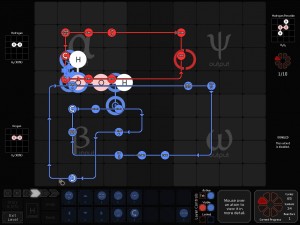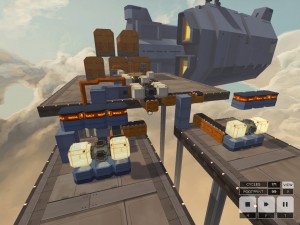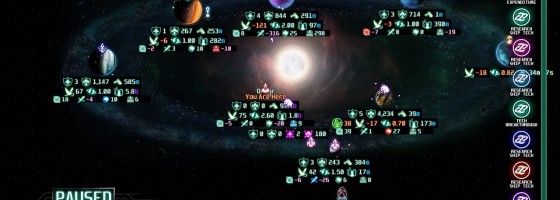Today’s post returns to an important point I’ve talked about before — Feedback and how it relates to learning and not just in video games. In the past I’ve talked about the differences in abstracted systems like strategy games vs. real time systems like in fighting games. But a recent conversation that will be a podcast soon got me thinking about how it’s not the type of mechanic, but the time it takes for the feedback that impacts learning.
Responsive Feedback:
For a quick recap, feedback is a very important learning tool when it comes to just about anything. Being able to see the reaction to your actions allows you to better understand how what you did directly translated to what’s happening.
In a previous post I talked about how action games were better at providing feedback to the player compared to strategy and 4X games and I said the reason was that you could directly see what’s happening. IE: You press the punch button and you punch someone or they dodge because of the defense mechanics.
But I’ve come to the realization that it’s not the type of feedback that makes it better or worse for learning, but the time it takes to get said feedback. The reason why action games are easier to learn compared to massive 4x games is the simple fact that any action that the player makes provides an immediate response and feedback to the player.
And this goes both ways, the immediate feedback allows the player to trace it back to their recent action and can process what happened for future situations. This is also why visual learning is stronger than just reading as you’re providing the person with the action and feedback that they can learn from.
Taking this further, I’m going to tease an upcoming podcast and how two games of similar thinking and design had vastly different learning curves for me.
Building Blocks:
I recently had a group discussion with Zach Barth from Zachtronics about educational games and learning and we talked about the challenges that went into someone learning Infinifactory vs. Spacechem. Both titles were about building a production chain with Infinifactory about an assembly line and Spacechem with chemicals and commands.

Spacechem was tough to learn as you were dealing with abstracted concepts that were hard to get feedback based on how you built your command chain.
The thought process for both games require the player to construct a solution step by step that will solve the problem at hand but for a lot of people and including me it was harder to learn Spacechem.
The reason is that Spacechem’s puzzle designs leaned more towards programming which is a very abstract concept and more importantly, one that doesn’t provide immediate feedback.
Any programmer can tell you that it’s very hard to compartmentalize a multi function program and test as you go along. The reason is that many parts of programming rely on your other pieces of code to work and you can’t reliably test a program until the entire foundation is done. There are certain exceptions like simple for loops and if statements, but if you’re trying to build something that makes use of multiple functions all working together, that’s a different story.
This means the code that you’re typing is not going to provide you with feedback for minutes or even hours depending on the scope of the program and by then you’ll have a lot of code and it will be harder to track down any problems. That’s why Spacechem’s learning curve was so high as it also forced you to make multiple commands without the benefit of instant or immediate feedback.
However Infinifactory doesn’t have this problem as it’s less about programming and more about an assembly line and engineering. Here, you want to (and can) test every section of your design as you go and it allows you to both get that instant feedback and to compartmentalize your solution into these different sections that have a specific function and design. The goal is to get each section working independently of the whole and then running the whole thing together where the sections will combine into a fully working machine.
But now comes the tough part: Can we apply immediate feedback to the very genres that I’ve criticized for being hard to learn?
Immediately Delayed Feedback:
Complex genres like 4X, grand strategy and even just regular turn based strategy games are some of the hardest ones for new players to learn. The problem is that by their very design, the player is not going to get immediate feedback. You’re not going to figure out how adjusting your tax rate will affect your economy and nation for the next twenty years, five seconds after adjusting the rate.
These genres are built on complex simulation models that determine the outcome of the game and your actions in relation to everything else that’s going on which makes getting that instant feedback difficult. Actions that you take may not have their full impact for dozens of turns or after 30 minutes or more of play and by that time, you would have already forgotten what you did originally.

Whereas Infinifactory allowed players to easily and often test the different parts of their solution and provide feedback as to what was happening.
This is where having detailed tooltips and a good UI can come in handy to give the player an immediate idea of the future of their actions.
For instance, if you’re trying to manage tax rates and their impact on happiness, you should spell out to the player that keeping your tax rate at X will impact Y and Z over time and checking out your happiness should allow the player to trace the stat back to their tax rate.
In this way the player is given immediate feedback of how their actions will affect things and can later trace that feedback back to the respective action. The Civilization series is a good example of this as the UI was designed to always show the player what’s going on and how everything is impacting the player’s nation. Information is repeated in relevant areas so that actions and responses can be traced back to each other from either end.
I’ve said this before but there are three key pieces of information the player should be understanding about anything they do in a game: What is the action at their disposal? What will it impact? And why should they do it?
What you don’t want to do is have “fire and forget” choices where the player is only given an abstracted idea of what they’re doing in relation to the simulation model. There is a difference in feedback between:” Upgrading your schools will improve education” vs. “enhanced schools will increase the numbers of enrolled students to 500 and raise maintenance fees to $300 a week.”
The former is merely lore or fluff that doesn’t provide feedback to the player’s choice while the latter gives the player information for what’s coming down the line and can be easily traced back to if the player is looking at their economy.
Time to Learn:
The takeaway from this post is that the sooner the player can see the impact from their choices, the easier it will be for them to learn how the game works. While lore is great from a narrative perspective, it’s important to provide the player with some actual information as without it, they will just be pushing buttons and hoping that something good happens.


